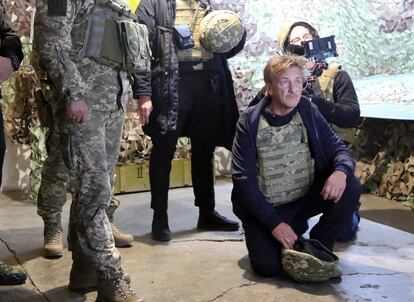Ben Stiller, Sean Penn blacklisted by the Kremlin over their support for Ukraine
Both US actors met with President Volodymyr Zelensky to express their admiration, and their movies are no longer being shown in Russia


Ben Stiller, Sean Penn and Volodymyr Zelensky are three actors who are not appreciated by the Kremlin. The first two for their activism in favor of Ukraine; the last, for heading a government that decided to stay in Kyiv and resist an armored offensive on three fronts. Now, months after they met with the Ukrainian president, the Russian Foreign Ministry has placed both Hollywood actors on its sanctions list. They are banned from setting foot in Russia, where Western production companies are already avoiding showing their films at movie theaters or streamed on computers to avoid being singled out.
“It’s a great honor for me, you’re my hero!” the Zoolander actor told Zelensky in Kyiv on June 20. Ben Stiller, 56, was received by the Ukrainian president after visiting Irpin, one of the places that has suffered the most from the war. “What you’ve done, the way you’ve dealt with the country, the world, is really inspiring,” added the star of There’s Something About Mary.
Days later it was Sean Penn, 61, who traveled to Ukraine to shoot a documentary. Both actors are old acquaintances: their first contact was a Zoom interview made during the pandemic, and by chance they met again on February 24, the day that Putin ordered the advance of his troops on Ukraine. The American filmmaker, who in 2016 caused rivers of ink to flow in Russia for his seven-hour interview with Mexican drug trafficker El Chapo Guzmán, proposed in their third meeting that Zelenski participate in the Academy Awards gala.
The Ukrainian president was a popular comedian before winning the 2019 elections in a country exhausted by corruption, the power of the oligarchs and the war in the Donbas region. Interestingly, as a member of the well-known Kvartal group, he made numerous appearances in Russia over the years, some of them before Kremlin propagandists who today accuse Kyiv of being “a Nazi regime” to justify an offensive that has cost thousands of deaths and has no clear end in sight.

Other American actors could suffer the same fate as Stiller and Penn and get banned by Russia. Zelensky also received Liev Schreiber and Jessica Chastain, while Angelina Jolie, actress and special envoy of the UN Refugee Agency (UNHCR), paid a surprise visit to Lviv in May.
And it’s not only Hollywood or musicians like the members of Imagine Dragons who have shown their support for Ukraine. The fashion firm Balenciaga was one of the first multinationals to position itself clearly in favor of the attacked country and its creative director, Georgia-born Demna, traveled there two weeks after the fighting began. Since then, the designer has campaigned to remind the public that the conflict is still ongoing, and launched a fashion line with the blue-yellow flag, a symbol of the sky and the Ukrainian cereal fields. “I know very well and feel the pain that Ukrainians are going through. I have been thinking a lot about how I can help Ukraine and all the refugees who want to return home. That is why I focused on the humanitarian direction ‘Ukraine Recovery’, he wrote on July 29 on his Instagram profile.
Celebrity chef José Andrés has been particularly involved in helping the country. He traveled to the border with Poland in March to distribute food to thousands of fleeing refugees, and his organization World Central Kitchen (WCF), founded in 2010 to help populations in danger, went to the front lines to lend a hand. In April, a missile hit their kitchens in Kharkov, a Russian-speaking city that is still a Kremlin target more than half a year later.
Tu suscripción se está usando en otro dispositivo
¿Quieres añadir otro usuario a tu suscripción?
Si continúas leyendo en este dispositivo, no se podrá leer en el otro.
FlechaTu suscripción se está usando en otro dispositivo y solo puedes acceder a EL PAÍS desde un dispositivo a la vez.
Si quieres compartir tu cuenta, cambia tu suscripción a la modalidad Premium, así podrás añadir otro usuario. Cada uno accederá con su propia cuenta de email, lo que os permitirá personalizar vuestra experiencia en EL PAÍS.
¿Tienes una suscripción de empresa? Accede aquí para contratar más cuentas.
En el caso de no saber quién está usando tu cuenta, te recomendamos cambiar tu contraseña aquí.
Si decides continuar compartiendo tu cuenta, este mensaje se mostrará en tu dispositivo y en el de la otra persona que está usando tu cuenta de forma indefinida, afectando a tu experiencia de lectura. Puedes consultar aquí los términos y condiciones de la suscripción digital.








































